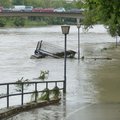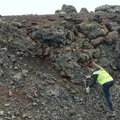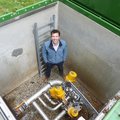Archive
18 October 2022
Rarest extreme rainstorms will become even more intense

Promovendus Gaby Gründemann berekende de regenval in 2071-2100 voor vier toekomstscenario’s, variërend van een wereld waarin de bevolkingsgroei en de fossiele energiebehoefte blijven toenemen tot een wereld die zich focust op duurzaamheid en een dalende CO2-uitstoot. Hoe dan ook zullen zowel de meest zeldzame buien als de jaarlijkse extreme buien in elk scenario heviger worden.
13 October 2022
Volcanic rocks solving CO2 problems

What if we could capture CO2 from the atmosphere and permanently store it under the ground in the form of solid minerals? MSc student Elara Redondo Garcia didn’t think twice when she had to opportunity to go to Iceland, where they are researching CO2 mineral trapping.
29 September 2022
ESA selects Harmony as Earth Explorer Flagship Mission

After years of in depth scientific and technical studies, ESA member states have formally selected Harmony as its 10th Earth Explorer flagship mission, set to be launched in 2029. Harmony was proposed in 2018 by an international scientific team lead by Dr. Paco López Dekker. Earth Explorer (EE) missions address questions that have a direct bearing on climate change research and other societally relevant issues.
30 August 2022
Bert Wouters in NRC, Standaard, Scientias en Atlas: smelten van de ijskap

Wat gaat de Groenlandse ijskap doen? Het is in een wereld die rap opwarmt nog niet zo eenvoudig om dat te voorspellen. Er zijn wel computermodellen die de interactie tussen het klimaat en de ijskap beschrijven, maar die zijn niet perfect, zo stelt onderzoeker Bert Wouters, verbonden aan de Universiteit Utrecht en TU Delft. “Ze doen hun werk goed, maar er zitten nog onzekerheden in.
22 August 2022
20 million EU Grant for research underground heat storage

The EU aims to have a net-zero greenhouse gas (GHG) economy by 2050. At present, heating and cooling represent around 50% of the final energy demand in Europe and are for a large part supplied by fossil fuel derived energy. Large scale seasonal heat storage is a key strategy to decarbonize heating in order to achieve EU ambitions, because sustainable sources like geothermal and solar provide a lot of heat in summer, while we need it in winter. The PUSH-IT consortium receives this Horizon Europe grant to demonstrate and develop such heat storage systems. PUSH-IT stands for Piloting Underground Seasonal Heat Storage In geothermal reservoirs.